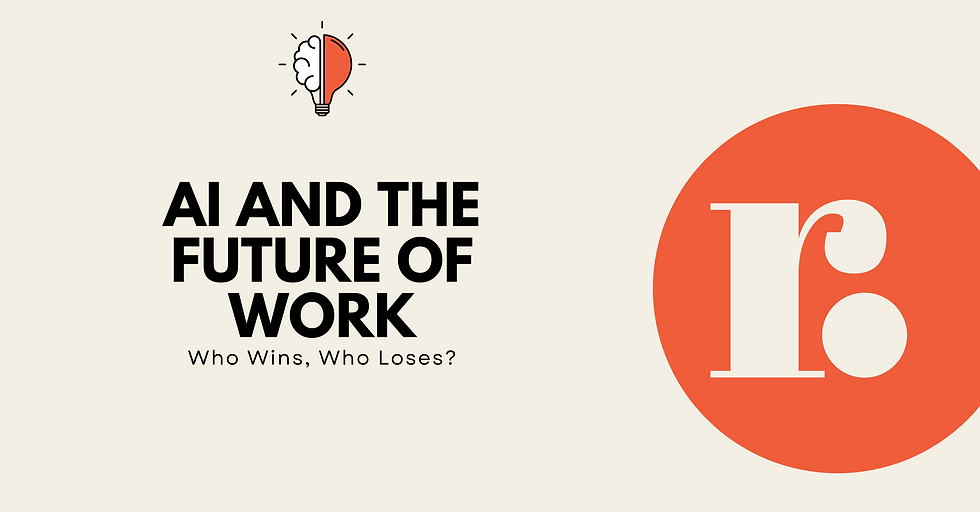The Rising Tide of AI Impact on Gen Z Tech Workers and Employment Trends
- recruteria

- Aug 24, 2025
- 3 min read
As technology advances, artificial intelligence (AI) is significantly reshaping the job market. For Gen Z tech workers, this transformation has led to a spike in unemployment rates, which are rising three times faster than the national average. Understanding how AI influences employment trends is vital for younger generations entering the workforce. This blog post explores both the challenges and opportunities that arise in our AI-driven landscape.

Understanding AI's Role in the Job Market
The rapid rise of AI has changed various sectors, especially tech. Automation and machine learning are streamlining tasks, increasing productivity, and decreasing the demand for human labor in numerous jobs. For instance, roles in data entry and customer support are increasingly handled by AI systems, replacing positions that Gen Z tech workers might seek as they start their careers.
Recent data reveals an alarming trend in the unemployment of Gen Z tech workers. As of 2023, this demographic's unemployment rate reached 14%, compared to the national average of 4.5%. This drastic difference highlights the unique challenges that young workers face as they compete in a shifting job landscape.
The Impact of the Pandemic on Employment
The COVID-19 pandemic accelerated the adoption of AI technologies across companies. Remote work has transitioned from a temporary solution into a long-term business strategy. Today, organizations are more likely to implement AI to enhance efficiencies and streamline operations. For Gen Z job seekers, this shift means they are competing not only with their peers but also with potential candidates from around the globe who may possess advanced AI skills.
For instance, a report from McKinsey indicates that by 2030, up to 25% of jobs in the US could be negatively impacted by AI and automation. This trend puts pressure on young workers to adjust their skills and adapt to emerging technologies.
Adapting to the New Job Market
To navigate this changing landscape, Gen Z tech workers must focus on developing skills that work alongside AI. Skills such as critical thinking, creativity, and emotional intelligence have become crucial as machines take over routine tasks. In fact, companies are now prioritizing candidates who can think critically and adapt in complex environments.
Additionally, technical skills related to AI and data analysis are key. For example, mastering data interpretation tools like Tableau or learning programming languages like Python will set candidates apart in a competitive job market. Educational institutions need to adapt their programs to provide students with training that aligns with these shifts.
Lifelong Learning and Networking
Beyond formal education, it is essential for Gen Z workers to stay updated on industry trends. Engaging in networking opportunities, attending workshops, and pursuing continuous learning can enhance their competitiveness. Programs such as coding boot camps have proven effective, helping participants gain relevant skills in a short period.
Mentorship also plays a vital role in career advancement. By seeking guidance from experienced professionals, young workers can gain insights and strategies that can help them navigate their careers more effectively.
Embracing Opportunities for Growth
While the rise of AI presents challenges, it also opens doors for innovation and growth. Companies that effectively integrate AI into their operations can improve products and customer experiences. Research shows that 85% of executives believe that AI will allow them to develop new business models and service offerings.
For Gen Z tech workers, this means that while traditional roles may diminish, new positions will continue to appear—requiring fresh skill sets. Jobs in AI ethics, machine learning specialization, and data analysis are already on the rise, showing that adaptation and learning remain key for job seekers.
Looking Ahead
The growing influence of AI is transforming career landscapes for Gen Z tech workers, leading to increased unemployment rates and a necessity for adaptation. By honing complementary skills, staying informed about industry developments, and committing to lifelong learning, young professionals can situate themselves favorably in this evolving environment.
As we move forward, the relationship between AI and employment will progress. Gen Z will benefit from remaining flexible, open to change, and proactive in their career paths. These strategies will not only help them navigate the future but will also empower them in our AI-driven world.
For those seeking to understand these trends further, consider exploring resources that examine AI's impact on employment. It's a pivotal moment where adaptation can lead to substantial opportunities.

Comments